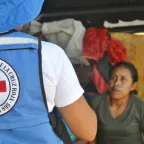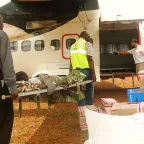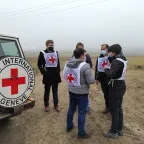ICRC medical standards for departure on mission
Most of ICRC missions are in remote locations, and any inability to be posted in remote areas will de facto preclude obtaining of a medical clearance. All new employees to the ICRC must submit to a …
Most of ICRC missions are in remote locations, and any inability to be posted in remote areas will de facto preclude obtaining of a medical clearance. All new employees to the ICRC must submit to a …
Coding is the invisible sequence of instructions that underpins almost everything we do. It can be a lifesaving tool and an invaluable skill, especially in the work of a humanitarian. Think of the …

Ten months ago, when Andrés joined the Venezuelan Red Cross as a volunteer at their branch in the state of Apure, located to the southwest of the country, Lilimar had already been part of the …

The local scenario and the Safer Access methodology from ICRC Jaqueline Naibert, a nurse at a Health Unit in Porto Alegre (State of Rio Grande do Sul), makes a home visit to Ivone de Fátima Soares de …

People who had fled the violence in the province of Tanganyika returned to their land in 2019 and 2021. Since their return, they had been trying to get back to their normal way of life, including …

… amid a spiraling economic crisis. The loss of jobs, businesses and savings had a harsh …

Fai, 49, hospital staff "The assistance of DJF was helpful to my recovery. The crutches that I previously used hurt my armpits, and it’s difficult to use when the floor is slippery. In my stay here …
In normal times, the National Authority for Prosthetics and Orthotics (NAPO)’s Rehabilitation Centre in Khartoum is a bustling place, crowded with people of all ages and different physical …

The Béni area of northern North Kivu province has endured several years of violence in connection with the conflict between Ugandan armed group the Allied Democratic Forces and the armed forces of …

… homes in the fighting or aftermath. People's jobs and livelihoods have been hard hit. …

Try one of the following resources:
Created in 1863, the ICRC library, alongside the ICRC archives, provides an indispensable documentary reference on the organization itself and international humanitarian law.
International humanitarian law is based on a number of treaties, in particular the Geneva Conventions of 1949 and their Additional Protocols, and a series of other instruments.
Customary international humanitarian law consists of rules that come from "a general practice accepted as law" and that exist independent of treaty law.